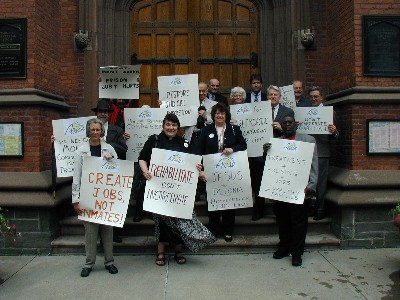New
York:
Edging
Closer
to
Rockefeller
Drug
Law
Reform,
Sort
Of
6/4/04
Under increasing financial and political pressure to undo at least some of the harshest provisions of the state's draconian Rockefeller drug laws, legislators in Albany this week announced a tentative agreement to reduce prison sentences for those convicted of the most serious drug crimes. Under the Rockefeller laws, enacted in the early 1970s, persons convicted of possessing four ounces or selling two ounces of illegal drugs face mandatory prison sentences of 15 years to life. But under the preliminary deal announced Wednesday, mandatory minimum sentences for these offenders would be reduced to as little as three to 10 years.
"B" drug offenders with prior nonviolent felonies are required to serve a 4 1/2-year mandatory minimum sentence. Because many drug offenders are addicts, they have managed to rack up previous felony records, making them subject to the "B" drug felony statute. More than 5,000 "B" drug prisoners are currently serving time in New York, more than twice the number of people serving more serious "A" felony sentences. Another 8,600 drug offenders are doing mandatory minimum sentences under lesser provisions of the drug laws. About 90% of New York drug prisoners are black or Latino, according to the state department of corrections. "I don't think anyone can predict the outcome," said Robert Gangi, head of the Correctional Association of New York (http://www.corrassoc.org), a member of the Real Reform 2004 coalition (http://www.realreform2004.org) that emerged this year to carry on the years-long battle for reform. "The Democrats and Republicans are talking, but it is hard to assess how real it is and how much of it is a show designed to diffuse some of the pressure on them," Gangi told DRCNet. "The key issue remains judicial discretion, and whether or not Senate Republicans will agree to return any kind of discretion to judges." "I attended some of the conference committee hearings this week," said Michael Blain, the day before the "A" compromise was announced. Blain is Policy Director for the Drug Policy Alliance (http://www.drugpolicy.org), one of the key players in the formation of Real Reform 2004. "The hearing room was packed with real reformers, such as members of the New York Mothers of the Disappeared and ARISE, the interfaith drug policy reform organization," he told DRCNet. "The topic was sentencing, and there was some agreement on the "A" felonies and the lesser drug offenses, but when the "B" sentencing came up, the Republicans hit the roof." While Blain and the Real Reform 2004 coalition lauded progress on the "B" prisoners, that is not nearly enough, he said. "Our coalition has four goals: judicial discretion, sentencing reduction, retroactivity, and treatment outside the walls," Blain said. "Even the Assembly bill is not far enough left for us. For instance, it is okay with treatment in prison, but we are not okay with that. We want community-based treatment and we want it funded by the state. There would still be significant savings compared to incarcerating people," Blain argued. "We are concerned that retroactivity be addressed," said Randy Credico of the William Moses Kunstler Fund for Social Justice (http://www.kunstler.org) and the New York Mothers of the Disappeared. "These folks who are sitting in prison now have families who have been the main soldiers in this for seven years now. It would be a shame if they come up with something that leaves those people behind," he told DRCNet. "That would be like going to Las Vegas, putting $200,000 in the slot machine, getting $5,000 back, and thinking you're a winner."
"The Argentine Mothers of the Disappeared had a huge impact," said Credico, citing extensive press coverage generated by their visit to the city. "They had a meeting with Senate majority leader Joseph Bruno, and he called for a conference committee immediately afterward. They met with Manhattan District Attorney Robert Morgenthau, and when they were done, he came out for Rockefeller law reform. When you have the foremost Latin American human rights group knocking on your door and pointing the finger at you, you respond. Also, many of the Rockefeller law prisoners are Latino. The Latino vote is the X-factor, so when you have Latin American activists like the Mothers taking a stand, the politicians take notice." But while the Argentine Mothers turned up the pressure on elected politicians, they were by no means alone. They worked with the New York Mothers, who are part of last year's Drop the Rock reform coalition (http://www.droptherock.org), which in turn is part of this year's Real Reform 2004 coalition, a broad-based grouping consisting of more than 60 advocates, activists, experts and Rockefeller survivors' families' organizations. And with Gov. George Pataki and legislative leaders having vowed for years to reform the Rockefeller laws, newspaper editorialists around the state have also been upping the pressure. "The governor and the legislature should find room for compromise and get it done this year rather than worsen the problem by delaying reform," editorialized the Watertown Daily News late last month. "Send Drug Addicts to Treatment -- Not Prison," chimed in the Rochester Democrat & Chronicle a few days earlier. But while conservative legislators are talking the talk on Rockefeller law reform, they are not walking the walk. Sen. Dale Volker (R), co-chairman with Assemblyman Jeffrion Aubry (D) of the drug reform conference committee, remains resistant to any changes in the "B" drug felony sentencing. Allowing those offenders to avoid prison would be a "dramatic change in our entire sentencing scheme," Volker complained during the hearings. "You're absolutely correct," Aubry retorted. Aubry is the author of the Rockefeller reform bill passed in the Assembly that is the subject of the conference committee and a proponent of sweeping changes in the drug laws. And recalcitrant prosecutors, who stand to lose god-like powers over sentencing decisions if real reform is passed, and law enforcement officials in favor of the status quo, are circling the wagons. On Wednesday, they formed the Law Enforcement Coalition Against Drug Decriminalization, the New York Times reported. Composed of the state District Attorneys' Association, the state Association of Police Chiefs, the state Sheriff's Association, and police unions, the group announced it would work against reforms that would allow repeat felony offenders to get drug treatment instead of prison time. "What these guys want is an anti-reform reform," said Credico. "They want something they can call reform but that isn't because they are not about social justice but social control and maintaining the business of the prison-industrial complex in New York state. What I fear is that even though the public wants to see an end to the Rockefeller laws, we will end up with very little and people will declare victory and that will take the air out of a lot of the movement," he explained. "They've protected the Rockefeller drug laws so far and have ceded very little ground." Michael Blain looked at the same situation and saw the cup half-full. "We have to get everything we can get this year," he said, "and we'll be back next year for more. We are all hoping and pushing for outright repeal of the Rockefeller laws; we need to just keep working together to get everything we can this year. The Rockefeller drug war is over," Blain said. "It's time to bring the prisoners home."
| ||||||||||||||||||||||||||||||||||||||||||||||||||||||||||||||||||||||||||||


